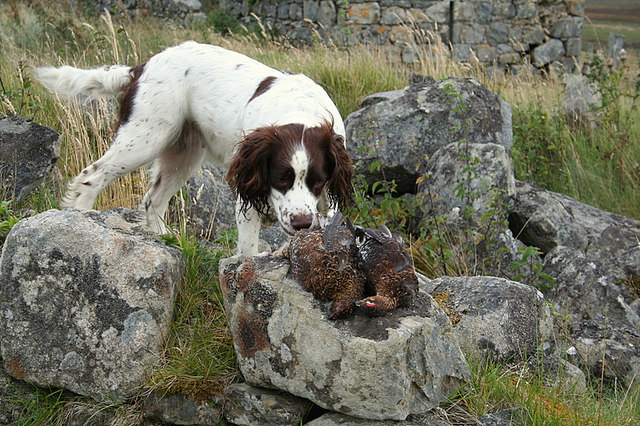While the Brexit debate raged on and election fallout continued, it was animal welfare that dominated many headlines in Scottish politics this week.
Unusually, Nicola Sturgeon faced questions on puppy dog tails in the weekly First Minister’s Questions after a vote to relax laws banning tail ‘docking’ at Holyrood on Wednesday.

Labour’s Kezia Dugdale led the charge, accusing the Scottish Government of backing the tail docking measure.
Ferret Fact Service assessed this statement and found it to be True.
Evidence
Tail docking is a controversial process in which certain breeds of dogs have a portion of their tails amputated, usually as newborn puppies. The process is often carried out on animals that may become working dogs (such as assisting during shooting season) and supporters claim it can prevent further injury later in life.
British Veterinary Association Scotland (BVAS), which opposed the tail docking exemption described the procedure as the “cutting through or crushing of skin, muscles, up to seven pairs of nerves, bone and cartilage”.
The practice was prohibited in Scotland in 2007 under the Animal Health and Welfare (Scotland) Act. The Scottish Government’s outright ban was the only one in the UK, with England and Wales putting in place exceptions.
Now the Scottish Parliament has voted to follow suit and relax the ban. The amendment brings in allowances for two breeds of working dogs – spaniels and hunt point retrievers (HPRs). It only applies to docking the final third of the tail.
It was passed after gaining backing of 86 MSPs to 29, with nine SNP members abstaining and one, Christine Grahame, voting against. The Conservatives also voted for the amendment, while the Labour Party and Scottish Greens opposed.
The vote was brought through after recommendations from the Scottish Parliament’s environmental committee, who took evidence from experts and conducted a consultation, which overwhelmingly backed the exception.
However, the consultation report noted that support was far more likely among organisations and individuals involved in field sports. The committee stated “animal welfare organisations and members of the general public tended to argue against a change in legislation.”
A YouGov poll in 2016 found 71 per cent of Scots were opposed to tail docking, and BVAS, OneKind and the Dog’s Trust published responses to the decision, with BVAS calling it a “retrograde step for animal welfare in Scotland”.
Concerns have also been raised over a perceived lack of robust evidence for tail docking, with BVAS citing a study commissioned in 2002, which said support for docking was “unsound from a scientific viewpoint” and “contrary to accepted standards” of welfare.
However, two studies highlighted by the committee found there was evidence that certain dogs suffered in later life with tail damage due to the nature of their work.
A British Medical Journal study said: “Working dog breeds that were examined by a veterinary surgeon were at a significantly greater risk of sustaining a tail injury than non-working breeds”.
It also concluded that to stop one working dog from suffering such an injury, 232 puppies would have to have tails docked.
A 2011 survey of working dog owners found 56.6 per cent of undocked spaniels and 38.5 per cent of undocked HPRs suffered tail injuries during the hunting season.
Ferret Fact Service verdict: True
Kezia Dugdale is correct in her claim regarding tail shortening. The exemption to relax the ban on docking was passed with the support of almost all SNP MSPs, with one voting against.The practice is controversial, and while a number of studies have found that docking could decrease tail injuries in later life, animal welfare charities and veterinarians have argued it is not compatible with animal welfare standards.

In response to an evidence request, Scottish Labour provided parliamentary records and responses by welfare charities.
https://www.sharethefacts.co/share/3b6ff8f8-e96c-4cae-a198-c386ea011721














